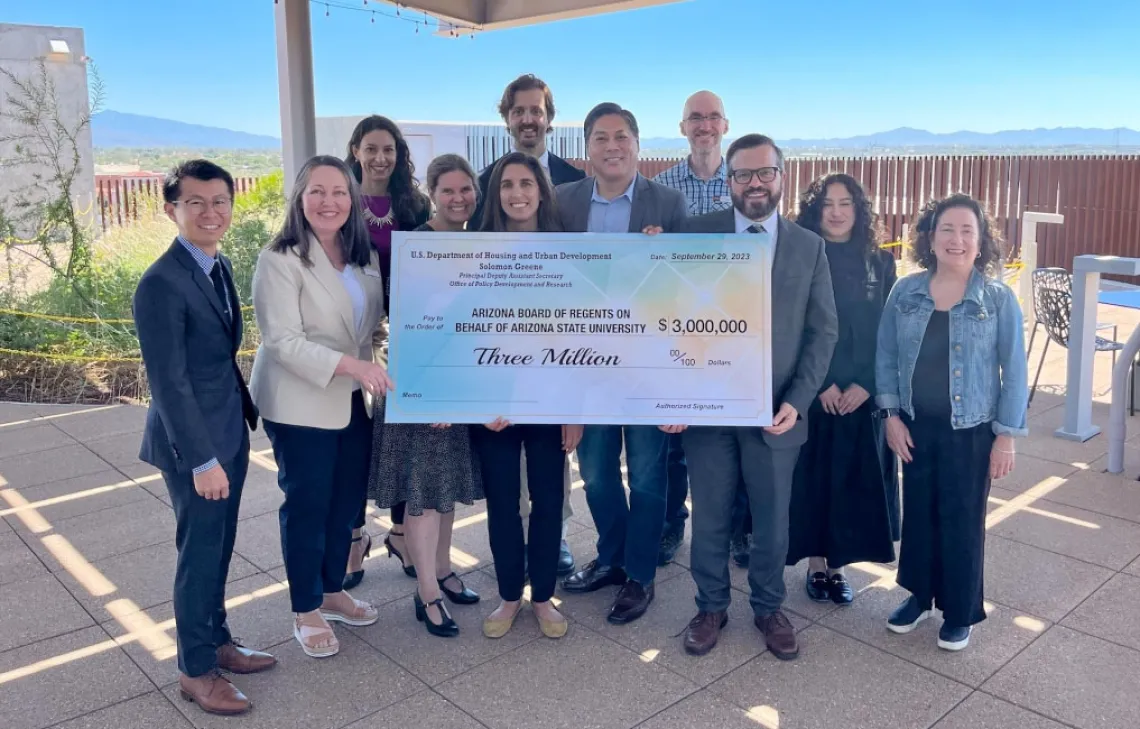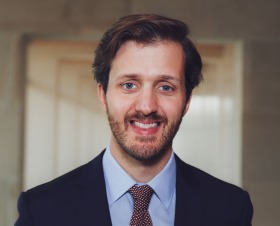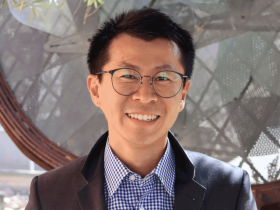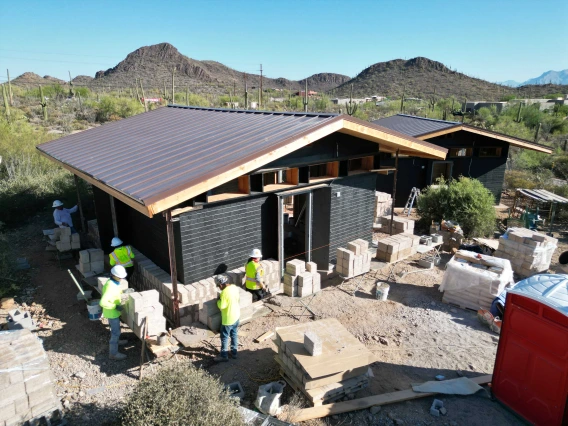Drachman Institute Will Help Establish New Center to Study Housing Equity and Sustainability with $3M Federal Grant

Leadership for the new Arizona Research Center for Housing Equity and Sustainability at a celebration on Friday, September 29, 2023 (left to right): Kenny Wong (UArizona), Kimberly Winson-Geideman, Morrison Institute Executive Director Andrea Whitsett, Allison Cook-Davis, Deirdre Pfeiffer, Dan Kuhlmann (UArizona), Jason Pu (HUD), Solomon Pomerantz (HUD), Solomon Greene (HUD), Sahian Valladares (HUD) and Madlyn Wohlman-Rodriguez (HUD). Photo courtesy the Morrison Institute for Public Policy
The University of Arizona Drachman Institute will help establish a new center to address the interconnected issues of housing security, climate and health with a focus on Hispanic and underserved communities in the arid Southwest.
A $3 million Hispanic Serving Institutions Research Center of Excellence grant from the U.S. Department of Housing and Urban Development will establish the Arizona Research Center for Housing Equity and Sustainability, or ARCHES. The new center will be a partnership among 19 researchers at Arizona State University, UArizona, Northern Arizona University and the University of New Mexico.
UArizona will receive $1 million of the total $3 million grant.
ARCHES will be co-located at Arizona State University's Morrison Institute for Public Policy and the Drachman Institute in the UArizona College of Architecture, Planning and Landscape Architecture. The Drachman Institute helps connect CAPLA's research and expertise to community needs related to advancing equity, resilience, connection and belonging across the built environment.
The new center's research on housing security will inform equitable housing growth and production to support Hispanic and underserved households. Research topics in this area include factors affecting housing security in Hispanic communities, access to homeownership, and evaluating shared equity homeownership, affordability mandates, home-based businesses and public education campaigns to mitigate housing insecurity.
On climate, ARCHES researchers will identify housing innovations for resilience in the arid Southwest. Projects will investigate how building codes and housing finance regulations affect the quality and climate resilience of housing stock and will provide recommendations and solutions to improve housing conditions, increase climate resilience and expand housing access for Hispanic and other underserved communities.

Daniel Kuhlmann, Assistant Professor of Real Estate Development and Planning
Finally, ARCHES researchers will study the linkages between housing and health, including how to create healthy homes and support aging communities. In this area, ARCHES scholars will uncover connections between housing quality and health outcomes, with attention to demographic and ecological contexts.
Daniel Kuhlmann, assistant professor of real estate development and planning, is co-principal investigator on the grant and will lead the UArizona's involvement in the center. Kuhlmann's research focuses include land use issues, real estate development and the businesses of residential landlords.

Kenneth H. Wong, Lecturer in Sustainable Built Environments
"This is a great opportunity to build the foundation for a sustained research center focused on addressing housing issues in communities across the Southwest," Kuhlmann says. "By building a talented team that spans universities, colleges and disciplines, ARCHES will be well-positioned to address the complicated and multifaceted housing challenges confronting our region."
Kenny H. Wong, a lecturer in CAPLA and a coordinator for the Drachman Institute's Housing Equity Lab, will co-direct ARCHES.
"ARCHES will produce community-engaged, equitable, evidence-based and solution-focused research to better house our diverse and local communities—it is a unique opportunity to act on our role as a land-grant and Hispanic-Serving Institution," Wong says.
The team of UArizona researchers who will contribute to ARCHES includes:
- Jonathan Bean, associate professor in the School of Architecture
- Mark Kear, assistant professor in the School of Geography, Development and Environment in the College of Social and Behavioral Sciences
- Atticus Jaramillo, assistant professor in the School of Landscape Architecture and Planning
- Alyssa Ryan, assistant professor in the Department of Civil and Architectural Engineering and Mechanics in the College of Engineering
ASU's Deirdre Pfeiffer will serve as ARCHES principal investigator.
"ARCHES will seed new research infrastructure to develop evidence-based and community-partnered solutions to housing issues in Arizona's Hispanic and other underserved communities," Pfeiffer says.
Research from the new center will have a particular focus on Hispanic and underserved communities in the region.
A community advisory board will inform research directions and development strategies as the research agenda evolves. ARCHES will also partner with the SouthWest Fair Housing Council, Chicanos Por La Causa and Home Matters to Arizona in research and community engagement activities.



